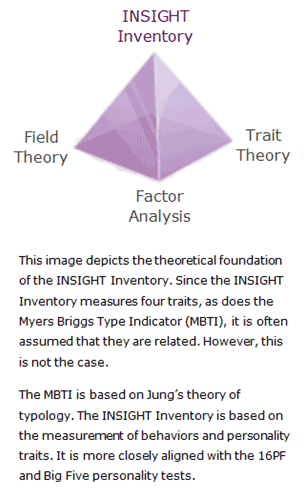Underlying Trait Theory of the INSIGHT Inventory Personality Assessment

The INSIGHT Inventory personality assessment owes its theoretical heritage to three areas of research of human behavior and the founding psychologist who developed them:
1) Kurt Lewin’s field theory and sociological study of how behavior changes in different environments
2) Gordon Allport’s trait theory, use of adjectives in the measure of personality traits and, writings on “insight” as the cornerstone of mature personality
3) Raymond Cattell’s scientific application of factor analysis in the identification of personality traits and relationships between test items
Field TheoryField Theory, developed by Dr. Kurt Lewin (1890-1947) emphasized that a person’s behavior (B) can best be understood by studying the interaction between his/her personality (P) and environmental pressures (E): B = ƒ(P, E). This theory was used because the INSIGHT Inventory asks participants to describe how they are in two environments, at work and at home. The two profiles help people determine how the different environments affect their behavior and better understand why they behave the way they do.
Trait TheoryThe use of adjectives as test items for the measure of personality traits was first formally studied and given scientific credence by Dr. Gordon Allport (1897-1967). Allport and Odbert (1936) identified over 4500 words in the English language which they felt described personality characteristics. These were divided into what was believed to represent various types of traits, dispositions, habits, attitudes, intentions, and motives. As a trait theorist, Allport wrote extensively about insight which he felt represented the mature personality, one characterized by self-awareness, acceptance, and good humor. The INSIGHT Inventory credits its name to Allport’s emphasis on “insight,” which he called the most desirable of all traits.
Factor AnalysisDr. Raymond Cattell (1905-present) pioneered the technique of using factor analysis to identify the most powerful factors of a personality test. Cattell developed the well-respected Sixteen Personality Preferences assessment, commonly called the 16PF, through factor analysis. Although it has 16 scales and the INSIGHT Inventory measures four traits, they have close correlations probably due to their similar technical development. Items (adjectives) on the INSIGHT Inventory were selected based on statistical analysis of their factor loadings. This resulted in the creation of personality scales that give people a meaningful and scientific way to compare themselves with others.